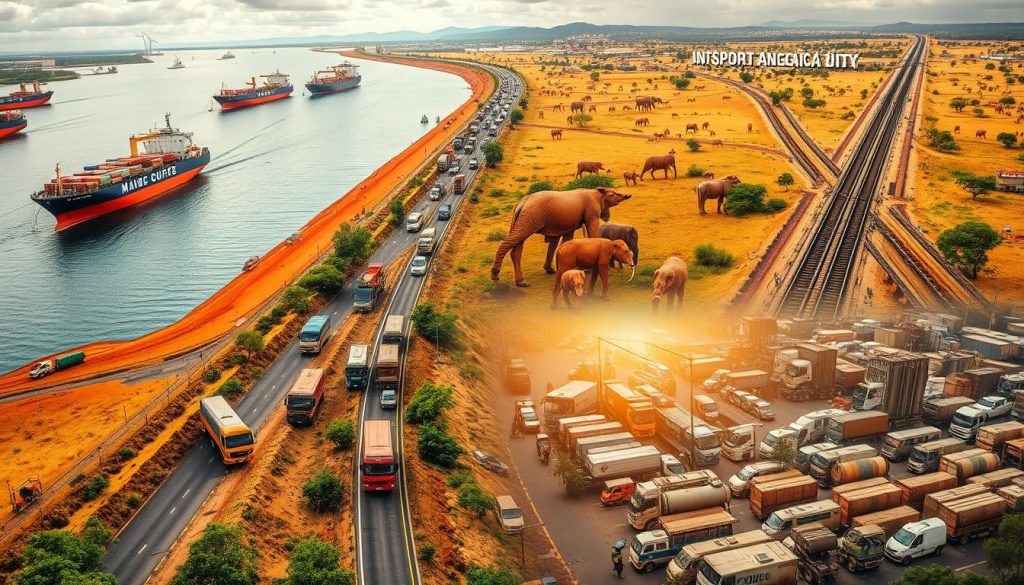The African transport business is growing fast. This is thanks to the continent’s rich natural resources and young people. As cities grow, there are exciting opportunities in logistics that people want to look into.
Logistics costs in Africa are high, making up 12% to 20% of GDP. This shows the need for new ideas and better ways to move goods. Investing in this area could be very rewarding, especially because Africa is a key link between global markets.
Overview of Africa’s Transport and Logistics Sector
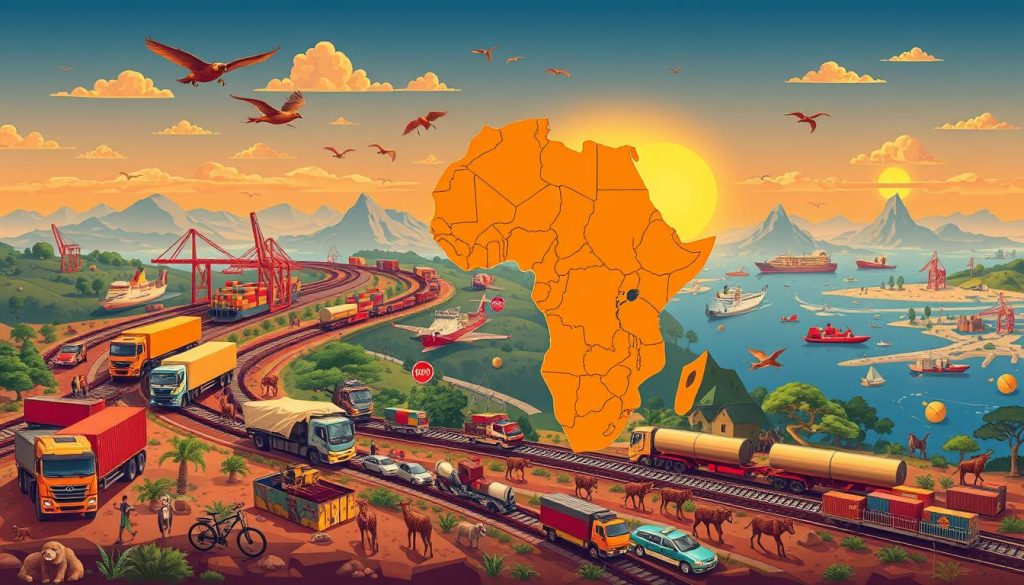
The transport sector in Africa is key for trade and connecting the continent. It includes roads, rails, air, and sea transport. This sector is crucial for the regional economy. Yet, there are big gaps in infrastructure and service quality, causing delays and extra costs.
South Africa and Kenya have better transport systems, making them key logistics centres. But, many countries face poor infrastructure, leading to more delays and higher costs. Efforts to improve roads, rails, and air transport show a push to better the sector.
The World Bank’s Logistics Performance Index shows big differences in African countries’ performance. This highlights the need for specific actions. The African Union’s Agenda 2063 aims to create better transport systems. It wants to boost trade and economic growth within Africa.
Current Trends Influencing African Transport & Logistics
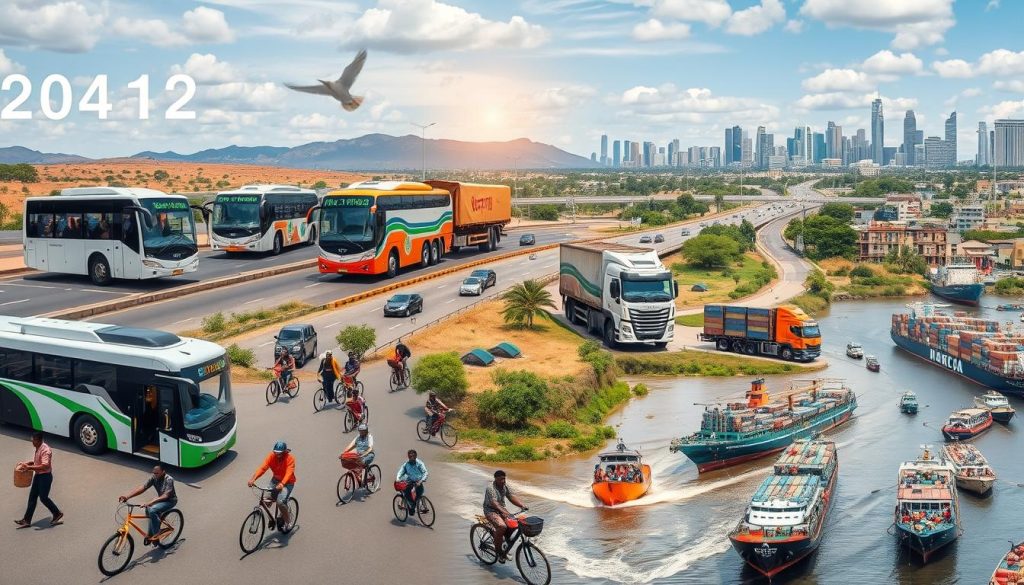
The transport trends in Africa are changing a lot. This is because of many factors. The logistics market is getting more digital, making things work better and faster.
Companies are using new technology to make things cheaper and better for customers. The growth of online shopping has been a big help. It has made logistics providers work harder to deliver quickly and manage their supply chains well.
There’s a big push for green transport in Africa. Companies are using electric cars and looking at clean energy. This helps the planet and meets global goals.
The COVID-19 pandemic has also made companies use new tech. They’re using digital tools to work better together. This has made things smoother for everyone.
The logistics sector is now all about being strong and quick to change. They’re using new ways to manage their supply chains. This helps them deal with ups and downs in the market.
Investments in good logistics solutions are on the rise. This ensures they can keep working well, even when things get tough. Africa’s transport and logistics are looking up, thanks to these changes.
Transportation and Logistics Business Opportunities in Africa
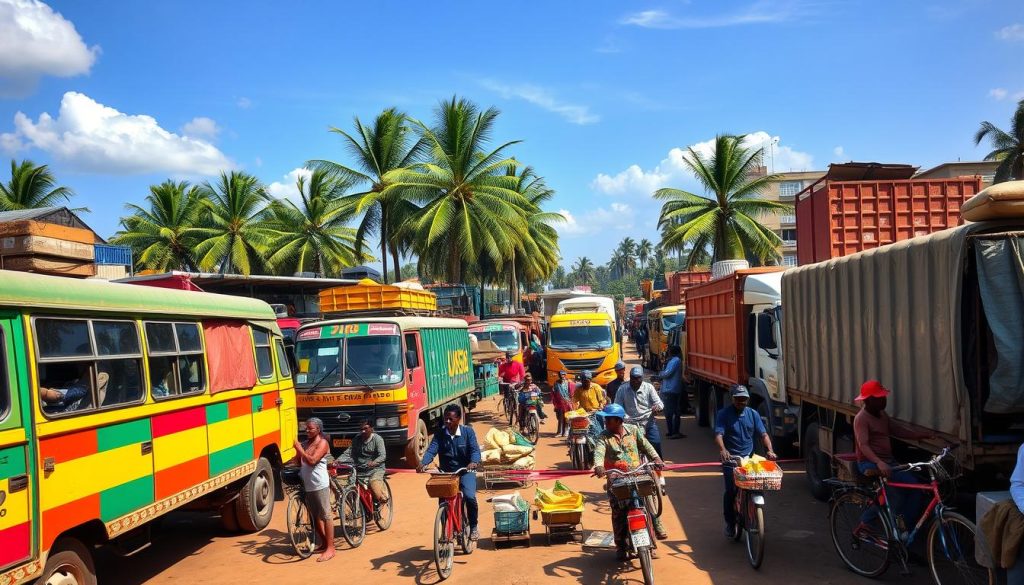
The transport and logistics sector in Africa is growing fast. This is thanks to many factors in key industries. Business opportunities in Africa are growing, especially in agriculture, mining, and tourism.
Each of these sectors has its own needs. These needs are changing the logistics landscape a lot.
Key Sectors Driving Growth
The agricultural sector is the biggest employer in Africa. It helps with food security and boosts the need for better logistics. The demand for fresh produce and staples is growing.
This is making transport networks more efficient. The mining and minerals sector is also important. It helps with export and import logistics a lot.
Tourism is recovering and creating new opportunities. This includes travel and freight services. These are key for handling more visitors.
Technological Advancements Impacting Logistics
Technology is changing logistics in Africa. Companies are using new software for tracking and managing inventory. This makes things cheaper and more efficient.
Online platforms are connecting suppliers with customers. This makes doing business across borders easier. Automation and AI are also improving operations.
They are making warehouses and analytics smarter. This is opening up big opportunities for transport investments in Africa.
The Role of Government Policies in Transport Development
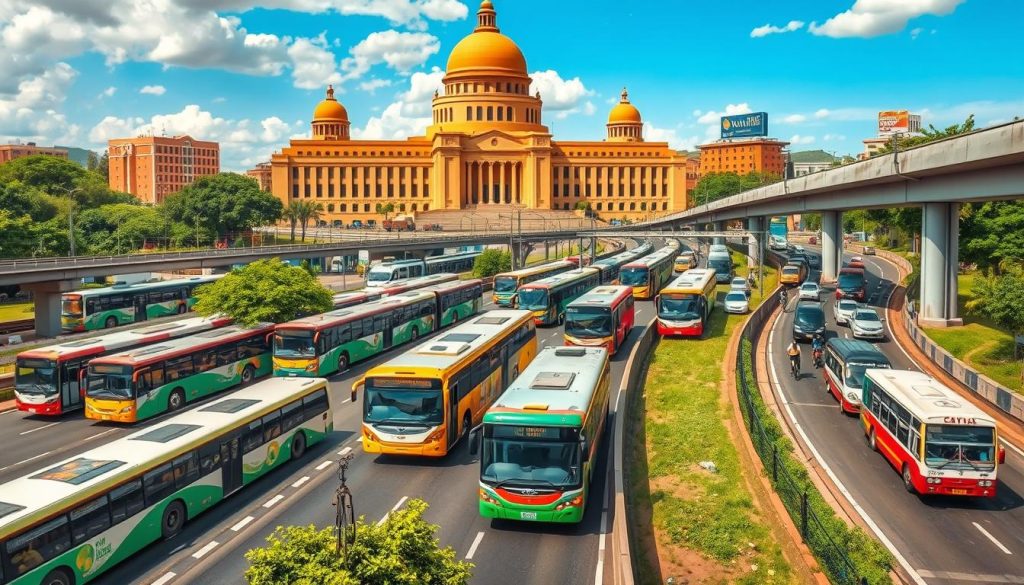
Government transport policies are key in shaping Africa’s transport and logistics. They aim to make transport services better and improve rules. This helps make things more efficient and lets private companies get involved more.
The rules for Africa’s logistics are very important. They help everything run smoothly across the continent. Governments use these rules to fix problems like too much red tape and unclear steps.
The African Continental Free Trade Area (AfCFTA) is a big deal. It helps with trade and investment. To make this work, countries need to improve their transport systems.
National transport plans work together with regional ones to boost infrastructure. This teamwork shows governments’ dedication to a better transport network. It helps with trade and growth.
Challenges Facing the Transport & Logistics Industry in Africa

The transport and logistics industry in Africa faces many hurdles. These challenges make operations slow and expensive. Poor infrastructure and complex rules are major problems.
Infrastructure Deficiencies
Transport infrastructure is a big issue. The World Bank says over 60% of Africa’s roads are unpaved. This makes moving goods costly and slow.
Rail networks are also a problem. They’re not enough to move goods across the continent. Ports in some countries cause delays in shipping, affecting supply chains.
Regulatory Barriers and Compliance Issues
Rules and regulations are another big challenge. Companies struggle with different rules in each country. Customs procedures are also complex.
This makes it hard for businesses to work efficiently. The World Economic Forum says clear policies are needed. Fixing these issues is key to improving logistics in Africa.
Investment Opportunities in African Transport Infrastructure
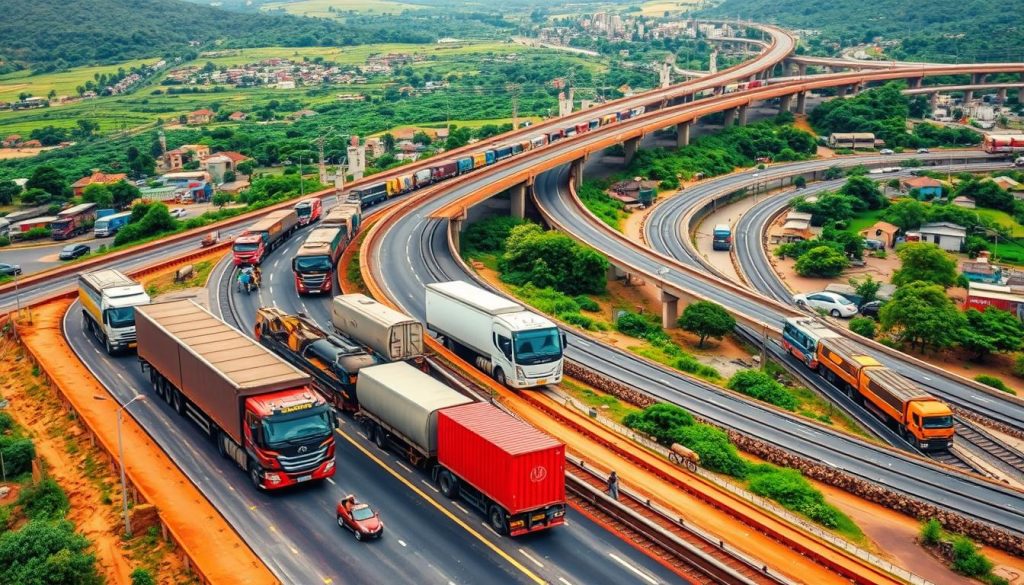
The transport infrastructure in Africa is changing, opening up many investment chances. Building key transport projects is key for the continent’s economic growth. Public-Private Partnerships (PPPs) are crucial here, helping private companies and governments work together to improve infrastructure. This is important because it helps fill the funding gap that often holds back progress.
Public-Private Partnerships (PPPs)
PPPs are a smart way to fund transport projects in Africa. They combine private sector skills and creativity to create better logistics and transport services. Key areas to invest in include:
- Road upgrades to make travel easier and more accessible.
- Rail expansions to meet the growing need for freight and passenger services.
- Port modernisation to handle bigger ships and improve cargo handling.
The African Development Bank supports PPP in logistics, seeing its value in boosting infrastructure across Africa. As more money goes into transport in Africa, these partnerships will be key in shaping the sector’s future.
Regional Variations in Transport and Logistics Capabilities
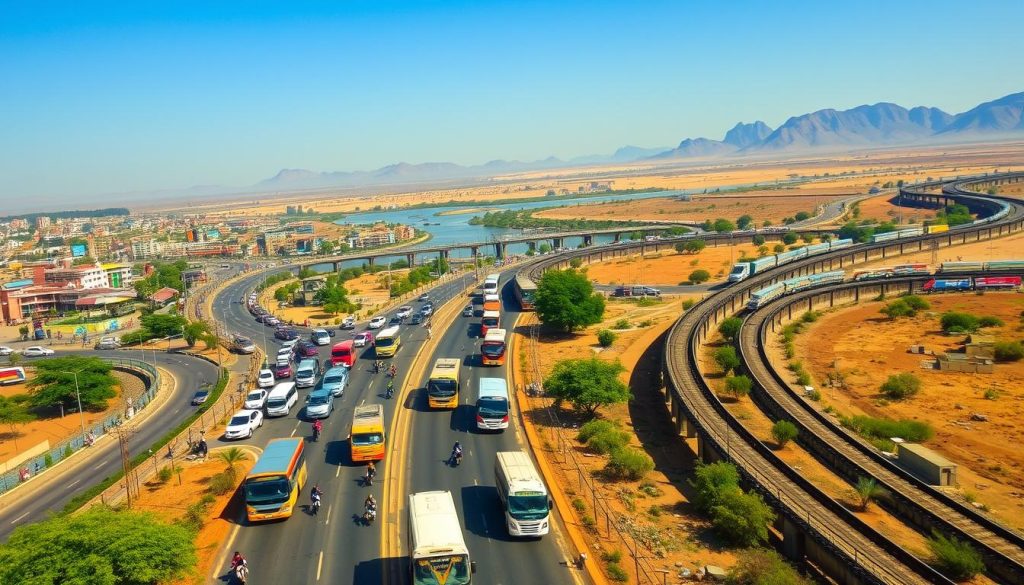
Transport in Africa changes a lot from one region to another. This is because of different economies and infrastructure. Sub-Saharan and North Africa have their own ways of moving goods, affecting trade and growth.
It’s important to know these differences. This helps those working in logistics to do better and make things more efficient.
Sub-Saharan Africa vs. North Africa
North Africa has better transport links, thanks to its close location to Europe. Its logistics systems make trade easier. On the other hand, Sub-Saharan Africa faces big challenges.
- Poor roads make moving goods by land hard.
- Ports are not as efficient, leading to longer waits for ships.
- There’s not enough good infrastructure to reach important trade routes.
Groups like COMESA are working to help Sub-Saharan countries. They want to improve transport together. Fixing these issues is key to growing trade and the economy in both areas.
Impact of E-commerce on Logistics in Africa
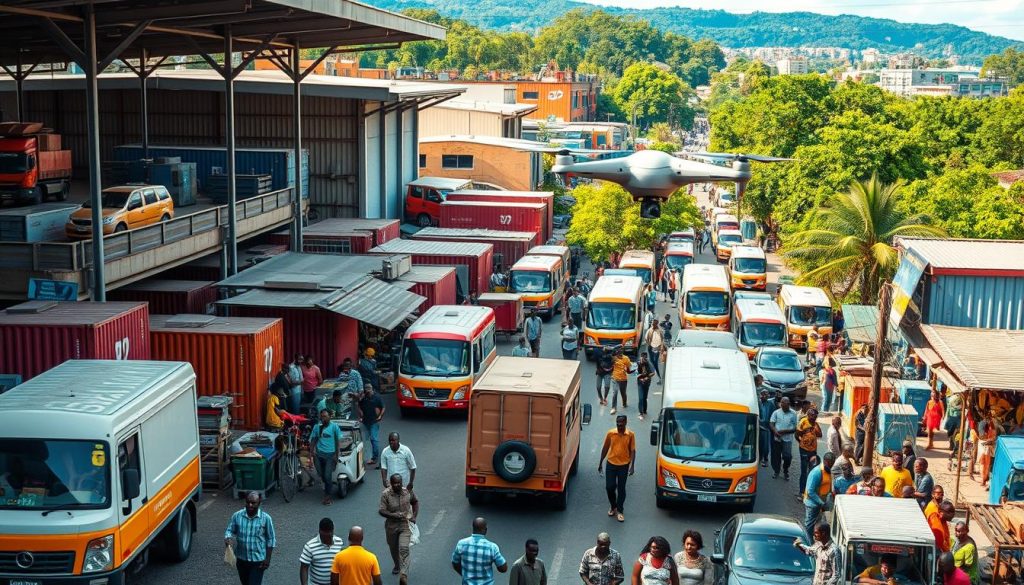
The rise of e-commerce in Africa is changing the logistics scene a lot. Local sites like Jumia and Takealot are getting more popular. This means there’s a big need for better logistics systems that can meet delivery promises.
There’s been a big increase in spending on last-mile delivery services. This is because more people are shopping online. Now, e-commerce logistics in Africa includes a strong network of warehouses and delivery vehicles. They are all set up to meet customer needs.
- Enhanced delivery speed through local fulfilment centres.
- Increased flexibility in delivery options for customers.
- Development of tech-driven solutions improving tracking and management.
Logistics companies are now offering more services because of e-commerce. They are changing to meet the needs of customers who want fast and efficient services. Using technology is key to making operations better. This helps businesses stay ahead in a fast-changing market.
Case Studies of Successful Transport Logistics Companies in Africa
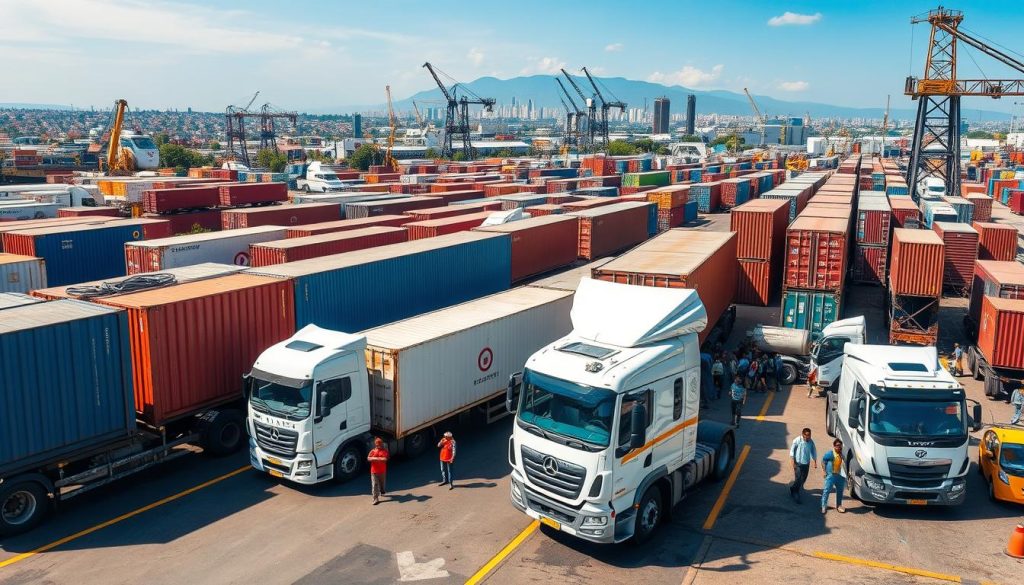
In Africa, many companies stand out for their logistics skills. They use new ways to make things run smoothly and improve their services. DHL and Safexpress are great examples. They use the latest technology and strong partnerships to stay ahead.
DHL has built a big network across the continent. They use smart logistics solutions for different market needs. Their focus on being green and efficient is a high standard for others.
Safexpress has also made big progress in logistics. They focus on making customers happy and being open about how they work. Through detailed studies, Safexpress shows it can handle Africa’s special challenges.
These stories are very helpful for new businesses trying to succeed in Africa’s logistics world. The methods and ideas of these companies can help others grow and achieve success in Africa.
Emerging Technologies in African Logistics
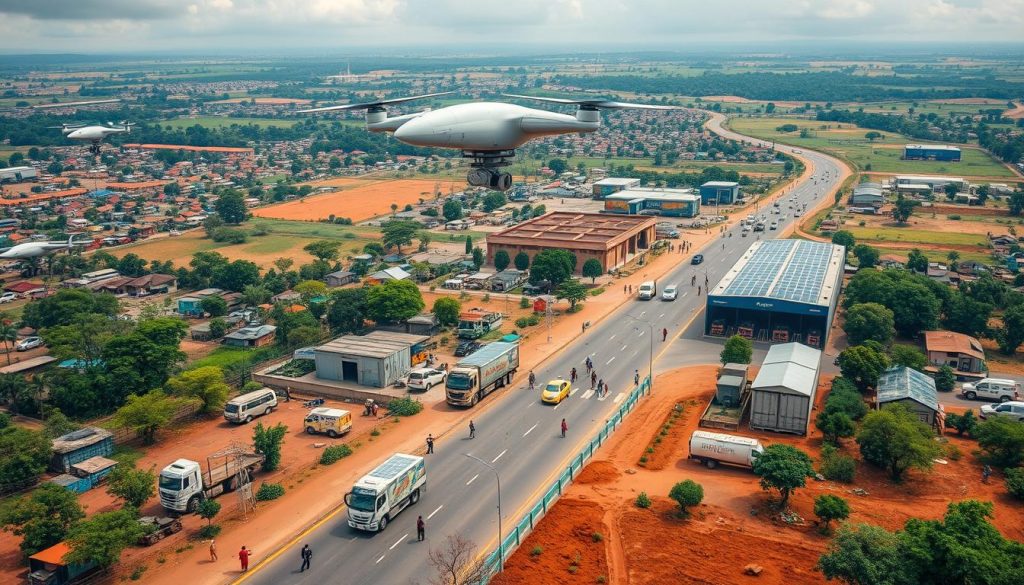
The logistics scene in Africa is changing fast thanks to new tech. Drones and automated vehicles are making things more efficient. They solve old problems and bring new solutions to the continent.
Utilisation of Drones and Automated Vehicles
Drones are key for reaching hard-to-get places. Zipline shows how drones can speed up medical supplies in places like Rwanda. They make delivery times shorter, helping in healthcare and aid.
Automated vehicles for freight transport are also on the rise. They’re still new but could make things cheaper and faster. As they grow, they might change how we move goods across Africa.
Sustainable Logistics Practices and their Importance

Sustainable logistics in Africa is becoming more popular as companies try to reduce their environmental harm. Using eco-friendly transport methods can help businesses succeed for a long time. It means making supply chains better and cutting down on carbon emissions.
Using renewable energy like solar power for warehouses and electric vehicles for delivery is key. It helps reduce emissions and saves money over time. Making transport routes more efficient also cuts down fuel use and ensures deliveries are on time.
Big names like Unilever are leading the way with green supply chain initiatives. They work on reducing packaging waste and finding sustainable sources for materials. The African Development Bank also backs these efforts, helping achieve sustainable development goals.
By getting involved in sustainable logistics, companies can create a culture of innovation. This appeals to customers who care about the environment. It also boosts a company’s reputation and helps meet green economy standards.
Future of Rail Transport in Africa

The future of rail transport in Africa looks bright. It’s driven by big plans for railway development and a push for better connections. Projects like the East African Railway Master Plan are key. They aim to boost trade by improving transport links.
The revival of the Trans-African Railway network is a big step forward. It will help unite regions, making trade faster and cheaper. Governments and private investors see rail as a key to solving traffic problems and providing reliable services.
Today, there’s a big move towards making rail a core part of national infrastructure. Upgrading and building new lines shows a strong commitment to a unified transport strategy. This highlights the need for policies that support rail growth and encourage new technologies.
International Collaboration and Trade Agreements
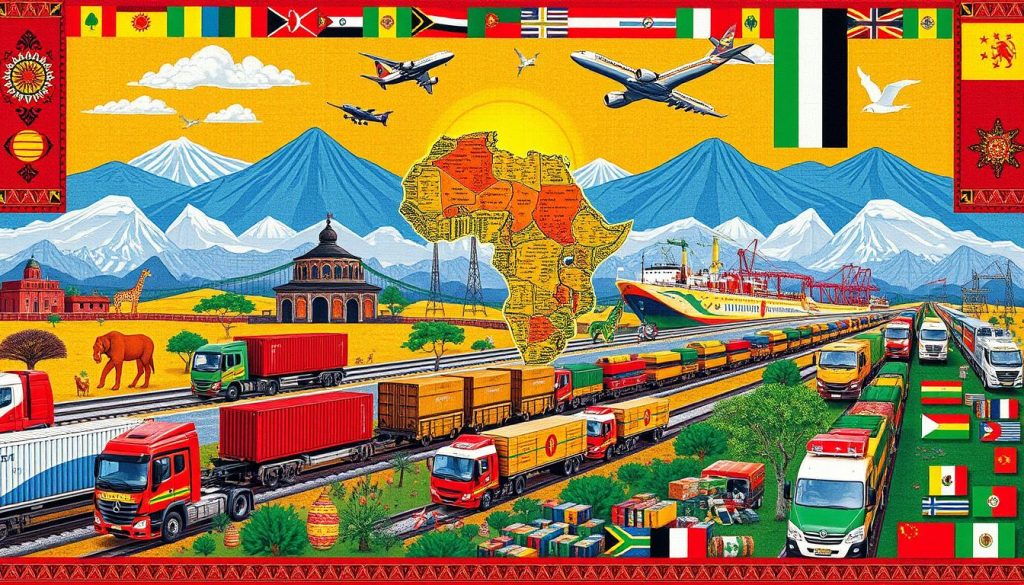
Working together is key to improving transport and logistics in Africa. The African Continental Free Trade Area (AfCFTA) helps by cutting tariffs and barriers. This makes trade easier and encourages countries to work together on transport policies.
Partnerships in Africa are vital for a unified transport network. Countries can share knowledge and resources, leading to better logistics services. Working together helps handle more trade and meets the needs of a growing market.
Collaborative trade agreements boost Africa’s economy. They make trade smoother and reduce obstacles. This leads to stronger economic ties and better transport services.
Skills Development and Training for Logistics Professionals
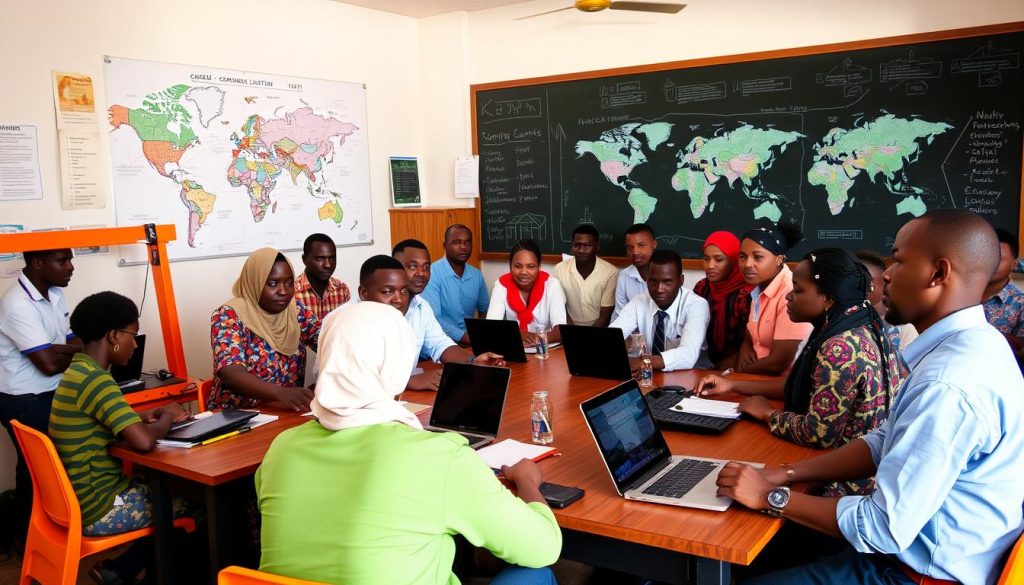
The logistics sector in Africa is changing fast. This means there’s a big need for skilled workers. Training in logistics is becoming a top priority for schools and companies to improve their teams.
These training programs focus on developing skills for handling complex supply chains and new technologies. They aim to prepare people for the challenges of today’s logistics world.
Many schools work with industry leaders to make their courses relevant. This partnership ensures training is practical and up-to-date. It helps learners understand the latest tools and strategies in logistics and transport.
- Emphasis on technological advancements in logistics.
- Hands-on training that matches industry standards.
- Continuous updates to training programmes to align with market trends.
Investing in skills development is key for a strong logistics workforce. Whether through formal education or training workshops, the focus on professional growth is crucial. It benefits both individuals and the industry as a whole.
Adapting to Market Changes in African Transport Services
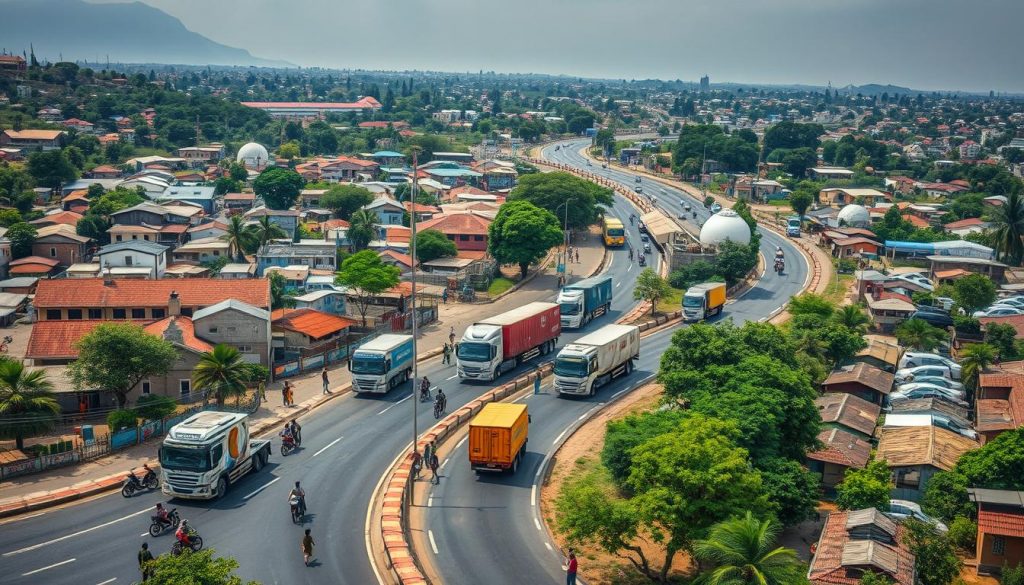
The transport industry in Africa is always changing. This means logistics companies need to be quick to adapt. They must use supply chain innovation Africa to stay ahead. This includes being flexible and working well with others.
By changing how they do logistics, companies can handle the market’s ups and downs better. This helps them navigate the complex world of transport.
Innovation in Supply Chain Management
Companies that focus on innovation in supply chain management do well. They use new technologies and build strong partnerships. This is key to keeping up with market changes.
- They use data analytics to predict trends and what customers want.
- Automation and AI help make operations more efficient.
- Working together with stakeholders makes things smoother.
- They also invest in green practices to care for the environment.
By using these strategies, logistics providers can keep up with market changes. They ensure they meet customer needs and have a strong supply chain.
The Impact of Global Events on African Logistics
The African logistics sector has seen big changes due to global events. These events show how connected the world’s economies are. Trade wars and the COVID-19 pandemic have made things tough for African businesses.
These issues have messed up supply chains and shown weaknesses. It’s time to rethink how logistics works across Africa.
Now, there’s a big push for African logistics to be more resilient. Companies are working to adapt to the changing world of transport. They’re focusing on different supply chain models to reduce risks.
This change helps businesses stay strong even when things get uncertain. It’s key to invest in managing risks to stay ahead and work well.
The effect of global events on African logistics is clear. It shows the need for a smart approach to managing supply chains. Being flexible and creative is crucial for businesses to deal with today’s challenges.
As Africa shapes its logistics future, looking ahead and working together is essential. This will help tackle current problems and grab new chances.

